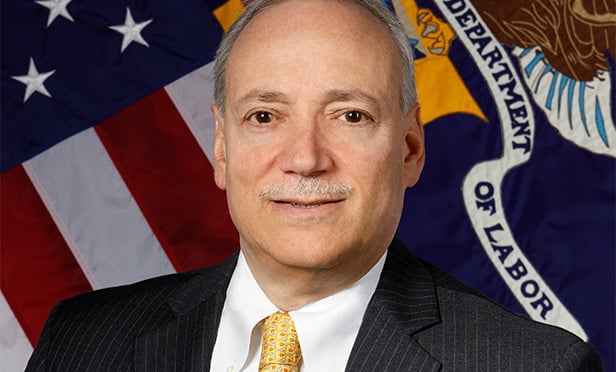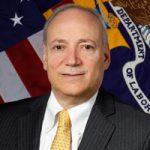 Deputy Labor Secretary Patrick Pizzella.
Deputy Labor Secretary Patrick Pizzella.
Although "fiduciary" is not a word used in everyday conversation, it's a term every investor would do well to learn. "Fiduciary" principles — derived from the Latin word for "trust" — have become a mainstay of modern law and society.
Having debuted in written law during the time of the Romans and gained prominence in English common law, today fiduciary principles are called upon to govern relationships of trust spanning many sectors, including retirement plans and health care, charities, family relationships and guardianships, corporations and employment, bankruptcy and trusts, and the list goes on.
A fiduciary relationship requires the utmost allegiance — what Supreme Court Justice Benjamin Cardozo famously described as "the punctilio of an honor the most sensitive."
Related: Borzi: DOL abandons its statutory mission to protect retirement savers
On June 29, the Department of Labor issued a proposal to strengthen and harmonize requirements for fiduciaries that provide investment advice to participants in employer-sponsored retirement plans and individual retirement accounts (IRAs).
In its proposed Improving Investment Advice for Workers & Retirees Exemption, the department furthers the Trump administration's commitment to putting workers first by strengthening participant protections while preserving investment advice options in privately sponsored retirement plans. This effort will help empower Americans to make independent and informed financial decisions, save for retirement and build individual wealth.
The department's proposal, which authorizes a wide variety of beneficial advice relationships while protecting retirement investors from abuse, is necessary in light of the many changes to the retirement market in recent decades, including changes to the ways retirement savers access investment advice. In the last half-century, we have seen a significant shift in the retirement landscape as workers now have more control of and responsibility for their retirement savings.
In 1981, about 64% of all pension plan participants had a "traditional" defined benefit pension. By 2017, this number was only 25%. Instead, defined contribution plans such as 401(k)s have grown in popularity, and in 2019, retirement savers had a total of $7.4 trillion invested in these plans.
The explosive growth in 401(k)-type plans and IRAs means that workers are increasingly contributing to and managing their own retirement savings. While this increased control provides retirement savers with greater flexibility, there is also potential for abuse. In response to this concern, the Department's proposal requires advisors to base their investment recommendations, including recommendations to roll assets out of 401(k) plans, on the best interests of workers — and not on the best interests of the advisor.
Under the Department's new exemption, investment professionals would be required to tell their retirement investor customers that they are acting as fiduciaries when making investment recommendations, so that all parties are clear about the nature of their relationship. And, as fiduciaries, advisors would have to adhere to Impartial Conduct Standards.
These include the requirement that investment advice be in the participant's best interest; a reasonable compensation standard that requires execution of a customer's trades at the most favorable terms reasonably available; and a prohibition on misleading statements about investment transactions or other relevant matters.
These protections are consistent with the requirements of other regulators such as the Securities and Exchange Commission, and like their standards, are derived from fiduciary principles. In support of these Impartial Conduct Standards, the Department's proposal would also require disclosure and efforts to mitigate any conflicts of interest when providing investment advice to plans and participant investors.
This may not be the first time you've heard of a Labor Department fiduciary rule. The Obama administration's 2016 rule resulted in many participants being left without access to affordable financial advice.
At that time, the House and Senate voted to block the rule from taking effect; but President Barack Obama vetoed the joint resolution. The rule was ultimately vacated by a federal court.
The Department's recent proposal avoids problems created by the 2016 rule while providing much-needed protections for retirement savers and appropriate access to investment advice options.
The Depression-era bank robber Willie Sutton, who escaped from prison three times and amassed a small fortune, reportedly was once asked why he robbed banks. Sutton replied, "Because that's where the money is."
With nearly $18 trillion in defined contribution plans and IRAs in 2019, retirement savings are where the money is. The Department's proposal will ensure that the high standards expected of a fiduciary — a designation that has held significance since the time of the Romans — are carried through the 21st century.
 Patrick Pizzella is the deputy secretary of the U.S. Labor Department.
Patrick Pizzella is the deputy secretary of the U.S. Labor Department.
© 2025 ALM Global, LLC, All Rights Reserved. Request academic re-use from www.copyright.com. All other uses, submit a request to [email protected]. For more information visit Asset & Logo Licensing.







